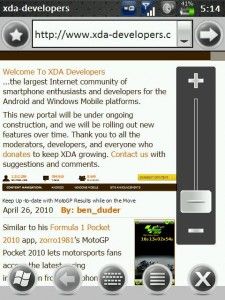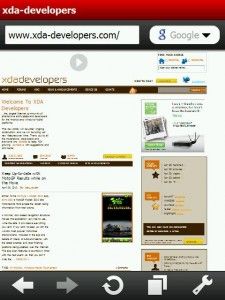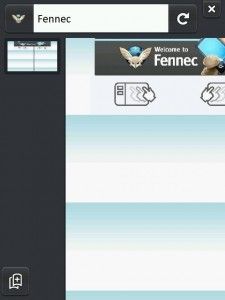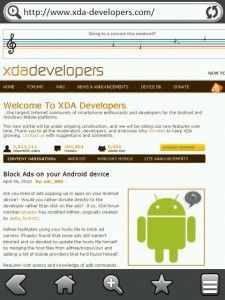One of the most critical applications to a smartphone is its web browser. Our devices stick out amongst others for having tools and performance similar to that of a normal computer, but they are useless unless they can provide an authentic surfing experience.
There are many options available to Windows Mobile users, and most are free. As I personally don't know all of the differences between the most popular devices, I decided to write a comparison to make it easier to decide which one is best for you!
For the comparison I'll be using an HTC Touch Pro (RAPH100) with the April 20th, Co0kie's Home Tab v1.7, 23563 EnergyROM by NRGZ28. I've given my device a clean flash, installing no additional apps or mods, to try to give an impression relevant to most users. All of my surfing will be done over WiFi – partially because I have no data plan and I’m pretty skint, but also because the faster speeds should make it clearer to see which browser can load pages in the least time (for those of you who care, I have an 8MB/s tested download speed and made sure I always had 5 bars for WiFi during the test).
For those of you who want to know how the Touch Pro compares to your device, it has a VGA resolution screen, 512MB of RAM and a 528MHz Qualcomm MSM7201A processor similar to those found in many recent HTC phones, including the Rhodium and the Topaz. Although the Touch Pro is now a little out-dated, its performance still compares to some of the newest devices available, meaning that results of this comparison shouldn’t differ too much from the experience of the average XDA frequenter.
Internet Explorer Mobile – Version 6 (preinstalled)
This browser is one of the most popular on the Windows Mobile platform, as it comes preloaded onto every stock ROM available. The recent update to accompany the launch of WM 6.5 has fixed previous woes of the browser, meaning it is now more finger-friendly and aesthetically more modern than it ever used to be.
However, although the simple, rather bland interface might suggest that this browser will be snappy, it took a staggering 2 minutes 48 seconds to load my test site (Rotten Tomatoes UK – a site I know to take eons to load even on my laptop). My suspicions of page-loading slowness were confirmed when it took my phone 2 minutes and 35 seconds for the XDA homepage to be visible. Despite this, button presses were reacted to quickly: application menus spring up almost instantly when no other programs are running, and switches from portrait to landscape didn’t freeze the device up at all.
A useful feature was an easily available option to switch between viewing websites as a phone, as a computer, or letting the app decide for you.
Opera Mobile – Version 10 and Opera Mini – Version 5 Beta
Opera Mobile is one of the most cooked-in browsers by chefs here at XDA, and for good reason. The browser is sleek and very attractive, featuring silk-smooth tab switching and integrated Google searching. The interface is very polished, making surfing a very nice experience.
However, all this digital sexiness comes at the cost of performance. Powerhouse devices such as the HD2 should have no problem with this, but having many tabs (or other apps) open while using this browser causes a noticeable speed decrease on my Touch Pro, albeit quite a small one.
It was only one minute 36 seconds before Rotten Tomatoes was fully loaded with Opera Mobile, although I could see much of the site only 16 seconds after pressing ‘Go’ – It took IEM around 50 seconds to reach this stage. Loading XDA was a similar story, with the page ready for me to browse around after 55 seconds.
A very neat feature in this browser is a small cursor, controllable using the device’s D-pad. There was also a ‘fullscreen’ mode, responsive scrolling and finger-friendly menus. ‘Gears’ is also integrated into Opera Mobile, meaning you don’t have to spend ages retyping usernames and passwords into that stupidly fiddly box on Facebook (which works brilliantly on this, by the way – much better than the official WM app).
My opinion on Opera Mini is essentially the same, as the only difference between the two apps is that for Opera Mini, the browser connects to a server to request a webpage rather than going directly from the phone.
Dorothy – Version 1.0.0.1 Beta
I have to admit that I’ve never even considered using Dorothy before this test. However, I was actually quite pleasantly surprised with my first impressions.
Despite garishly retro looks and a possibly too simplistic interface, the browser was smooth and felt very fast – this was backed up by a one minute eight second loading time for Rotten Tomatoes and a blistering 28 seconds for XDA.
Unfortunately, zooming left a little to be desired – no slider like Internet Explorer or double-tap like Opera Mobile. Additionally, rotation seemed to take ages, although the ‘Beta’ badge stuck to the app suggests that this code can be cleaned up in due time.
To fulfill my own curiosity I also tried Facebook on Dorothy. Despite the consistently fast page loading, some features, such as remembering usernames and passwords, were sorely missed. It also emphasised how much I rely on the zoom-tapping habit garnered from Opera. Scrolling stuck constantly and the ‘chat bar’ was right in the middle of the screen, instead of at the bottom where it should be.
Fennec (Firefox for Windows Mobile) – Version Alpha 3
Fennec, Mozilla’s answer to a portable version of Firefox, has been in its alpha stage for quite a long time, and as development has been put on hold it’s likely to stay that way for a while. The app itself has some great ideas – drag the screen to the right to see an open tabs bar, left for normal function buttons – but it seemed to me to be so slow and buggy that it was barely useable. In fact, and this might be down to my internet settings, I couldn’t manage to get a single webpage loaded with this browser, so I couldn’t give any details about page loading speeds (although given the bugginess of the app as it is, I’d say they would be pretty unimpressive).
Skyfire - Version 1.5
The main advertising point of the Skyfire browser is that it brings 'the PC web' to your phone. This means flash, music and video streaming and no site restrictions despite being on a mobile device.
As Skyfire is relatively young I've always been a little sceptical of how well it really achieves this aim, and once opening the app for the first time I wasn't instantly impressed.
The user interface is obviously designed to make the app 'streamlined' - a very minimal layout featuring just the address bar and the bare minimum navigational controls, all designed in a delightful shade of grey. As you may have noticed from how much I love Opera, I do appreciate a bit of eye candy from my browser despite a drop in performance so the boringness wasn't completely to my taste. Regardless, the controls were functional and easy to use, and I suppose that's all that really matters.
Eager to test the 'PC web on your phone' claim, the first site I paid a visit to was, of course, YouTube. Pages loaded deliciously quickly - I completely forgot I was browsing on a device whose browsers sometimes take two minutes to load a page - and there were no layout issues with the videos as with Opera.Once buffered, videos played instantaneously - something that sounds obvious but was lacking in other browsers. Audio was in sync and a relatively high framerate was maintained throughout.
Loading XDA-Developers took a mere 22 seconds and Rotten Tomatoes 57, making Skyfire a definite contender for the title of the fastest page-loading browser around. Skyfire also features an Opera-like cursor for more precise navigation, a handy 'Omnibox'-esque, 'one box for everything' address bar and my beloved tap to zoom feature.
Which is better?
As you may have guessed, I’m still a massive fan of Opera Mobile. Opera has clearly had a lot of work put into it: it’s very stable and smooth and there’s a lot of eye candy, with a very good page loading speed and a bunch of very useful features.
Internet Explorer Mobile is surprisingly slow for such a basic application, and although Dorothy shows very promising speeds, its interface is (to me at least) quite poor. Fennec is nowhere near ready for use as a default browser, and due to the imminent launch of Windows Phone 7 devices, it likely never will be.
However, Skyfire is a very strong all-rounder. It was Superman-on-speed quick when it came to navigating and, like Opera, came with a plethora of useful features. The plugin support on the browser is so well implemented that it warrants the app a look by itself: on none of the other browsers could I really get around the web as seamlessly as with Skyfire. I really do understand the 'PC web' tagline now.
So, my conclusion is that those looking for a bit of polish and something to show off to their friends should look into Opera Mobile. Dorothy has some convincing speed and is quite sturdy, but I think that (at least for now) it's definitely not the best out there. Fennec is so unstable and so obviously abandoned that it's not even worth considering as a replacement to your current browser. As for IEM, well, you never really thought that would win, did you?
Skyfire, despite having a reasonably dull style, is so surprisingly useful and fast that it has to be my pick as the best browser of the ones I tested. It really does bring the whole web to your hands and is definitely worth giving a go. You can find it here.








